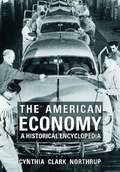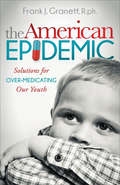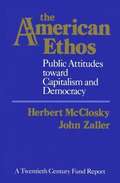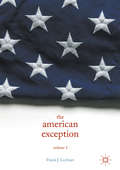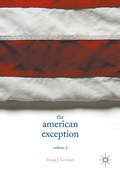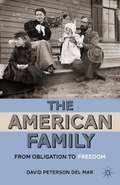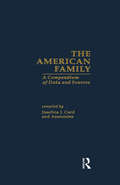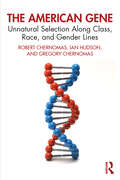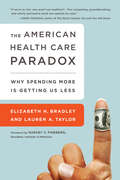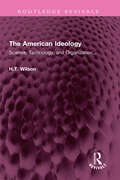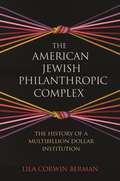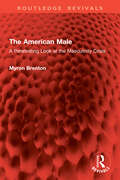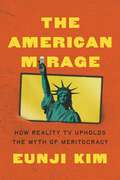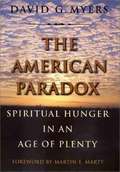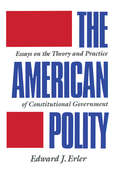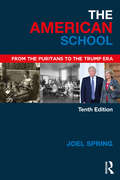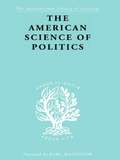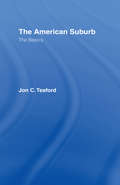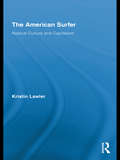- Table View
- List View
The American Economy: Essays and Primary Source Documents)
by Cynthia Clark NorthrupA comprehensive collection of entries, essays, and primary source documents emphasizing the importance of economic policy in all aspects of life in the United States.
The American Epidemic: Solutions for Over-Medicating Our Youth
by Frank J. GranettThe American Epidemic: Solutions for Over Medicating Our Youth provides new knowledge for parents, educators, all healthcare professionals, and public health policymakers to help rule out underlying risk factors of behavioral conditions prior to premature drug therapy. Nutritional, physiological, and environmental risk factors have created a behavioral health crisis in America. The American Epidemic: Solutions for Over Medicating Our Youth reveals how to eliminate these risk factors and revert children to normal behavior without drug therapy. Also discussed is the prudent use of drug therapy protocols to prevent harmful side effects.
The American Ethos: Public Attitudes toward Capitalism and Democracy
by John Zaller Herbert MccloskyThe book covers Libertarianism, Egalitarianism, the relationship between capitalism and democracy, ideology, and social and political awareness among the American public.
The American Exception, Volume 1
by Frank J. LechnerThis book examines what makes the United States an exceptional society, what impact it has had abroad, and why these issues have mattered to Americans. With historical and comparative evidence, Frank J. Lechner describes the distinctive path of American institutions and tracks changes in the country's national identity in order to assess claims about America's 'exceptional' qualities. The book analyzes several focal points of exceptionalist thinking about America, including the importance of US Constitution and the American sense of mission, and explores several aspects of America's distinctive global impact; for example, in economics and film. In addition to discussing the distinctive global impact of the US, this first volume delves into religion, law, and sports.
The American Exception, Volume 2
by Frank J. LechnerThis book examines what makes the United States an exceptional society, what impact it has had abroad, and why these issues have mattered to Americans. With historical and comparative evidence, Frank J. Lechner describes the distinctive path of American institutions and tracks changes in the country's national identity in order to assess claims about America's 'exceptional' qualities. The book analyzes several focal points of exceptionalist thinking about America, including the importance of US Constitution and the American sense of mission, and explores several aspects of America's distinctive global impact; for example, in economics and film. In addition to discussing the distinctive global impact of the US, this first volume delves into the economy, government, media, and the military and foreign policy.
The American Family
by David Peterson del MarTraces the movement from mutualism to individualism in the context of American family life. Families survived or even flourished during colonization, Revolution, slavery, immigration and economic upheaval. In the past century, prosperity created a culture devoted to pleasure and individual fulfilment.
The American Family: A Compendium of Data and Sources
by Josefina J. CardThis compendium is one of a series of social science research and teaching resources created by the American Family Data Archive at Sociometrics Corporation. It describes 28 data sets chosen by a panel of scientist-experts as having outstanding potential for secondary data analysis on issues facing today’s American family.
The American Gene: Unnatural Selection Along Class, Race, and Gender Lines
by Robert Chernomas Ian Hudson Gregory ChernomasBiological justification for all forms of inequality has a long history, with the claim that particular groups suffer disproportionately from inherited flaws of ability and character used to explain a remarkably wide variety of inequalities.Providing an important critique of that biodeterminist history and how the Human Genome Project has inspired some contemporary scientists and economists to follow a similar path of ascribing socioeconomic outcomes to genetic inheritance, The American Gene details new research that suggests that the social and economic environment can affect how genes express themselves in specific human traits and social outcomes. Using the three cases of the American white working class, Black Americans and American women, the authors demonstrate that relying on nature as an explanation is seriously flawed – showing that the socioeconomic inheritance created by the conditions in which these populations worked and lived offer a far better explanation than nature for the stratified results.This book is the story of an American history rife with unnecessary misery and the waste of human potential, along with the liberating effect of understanding the degree to which its citizens are the product of social inheritance and the potential power of a nurturing economy and society that equality promises.
The American Health Care Paradox: Why Spending More Is Getting Us Less
by Harvey V. Fineberg Lauren A. Taylor Elizabeth H. BradleyForeword by Harvey V. Fineberg, President of the Institute of MedicineFor decades, experts have puzzled over why the US spends more on health care but suffers poorer outcomes than other industrialized nations. Now Elizabeth H. Bradley and Lauren A. Taylor marshal extensive research, including a comparative study of health care data from thirty countries, and get to the root of this paradox: We've left out of our tally the most impactful expenditures countries make to improve the health of their populations-investments in social services. In The American Health Care Paradox, Bradley and Taylor illuminate how narrow definitions of "health care," archaic divisions in the distribution of health and social services, and our allergy to government programs combine to create needless suffering in individual lives, even as health care spending continues to soar. They show us how and why the US health care "system" developed as it did; examine the constraints on, and possibilities for, reform; and profile inspiring new initiatives from around the world. Offering a unique and clarifying perspective on the problems the Affordable Care Act won't solve, this book also points a new way forward.
The American Ideology: Science, Technology, and Organization... (Routledge Revivals)
by H.T. WilsonFirst published in 1977 The American Ideology presents an analysis of the ways in which Americans and the most advanced capitalist countries think about science, technology, and organization. In particular, the author describes it as an anti-sociological essay set within the broader area between sociology and philosophy as functionally legitimate disciplines within the academic division of labour. The ‘American ideology’ seems to revolve around the concepts of rationality and domination; the tension between these concepts is central to the work of Hegel, Marx, Weber, and the Frankfurt School. The author argues in particular that the social sciences are unavoidably a part of the problem expressed through this tension and not a neutral means of observing and resolving it from a distance. This book is an essential read for students and scholars of sociology, political science, and political philosophy.
The American Intellectual Elite
by Charles KadushinThere are almost as many works about intellectuals as there are intellectuals. Perhaps this is because intellectuals are masters of the word and their mastery is often used to write about themselves. Indeed, with the possible exceptions of sports figures and film actors, intellectuals may be the most overpublicized people in America. In this classic study, originally published in 1974, Charles Kadushin examines the attitudes of that class of people known as the American intellectual elite.While most works on intellectuals first establish who should be included under the title "intellectual," and debate their characteristics, Kadushin instead sets forth a sociological history of leading American intellectuals of the late 1960s. The book's concern, however, is primarily with time and place. While The American Intellectual Elite is very much about social circles and the networked "small world" of intellectuals defined by the institutions such as the journals and magazines around which they gathered, the uniqueness of this volume is the recognition that fact must come before theory. Thus, the collective attitude of leading intellectuals of the sixties are presented in a straightforward and dispassionate manner on topics as diverse as the Vietnam War, race relations, foreign and domestic policy, and the place of intellectuals in the resolution of such issues.Now in paperback with a new introduction by the author, The American Intellectual Elite is an influential work that will be valued by students of sociology, members of the intellectual elite, and professionals and students of contemporary American history.
The American Jewish Philanthropic Complex: The History of a Multibillion-Dollar Institution
by Lila Corwin BermanThe first comprehensive history of American Jewish philanthropy and its influence on democracy and capitalismFor years, American Jewish philanthropy has been celebrated as the proudest product of Jewish endeavors in the United States, its virtues extending from the local to the global, the Jewish to the non-Jewish, and modest donations to vast endowments. Yet, as Lila Corwin Berman illuminates in The American Jewish Philanthropic Complex, the history of American Jewish philanthropy reveals the far more complicated reality of changing and uneasy relationships among philanthropy, democracy, and capitalism.With a fresh eye and lucid prose, and relying on previously untapped sources, Berman shows that from its nineteenth-century roots to its apex in the late twentieth century, the American Jewish philanthropic complex tied Jewish institutions to the American state. The government’s regulatory efforts—most importantly, tax policies—situated philanthropy at the core of its experiments to maintain the public good without trammeling on the private freedoms of individuals. Jewish philanthropic institutions and leaders gained financial strength, political influence, and state protections within this framework. However, over time, the vast inequalities in resource distribution that marked American state policy became inseparable from philanthropic practice. By the turn of the millennium, Jewish philanthropic institutions reflected the state’s growing investment in capitalism against democratic interests. But well before that, Jewish philanthropy had already entered into a tight relationship with the governing forces of American life, reinforcing and even transforming the nation’s laws and policies.The American Jewish Philanthropic Complex uncovers how capitalism and private interests came to command authority over the public good, in Jewish life and beyond.
The American Male: A Penetrating Look at the Masculinity Crisis (Routledge Revivals)
by Myron BrentonFirst published in 1967, The American Male explores broad social patterns and major societal trends as they affect men in America. The author argues that American men are burdened by an outdated code of masculinity that stifles their personalities and limits their ability to enjoy life at every significant level. This explosive theme is based on two years of research involving men from various social and economic backgrounds, as well as extensive interviews with psychiatrists and other experts in the psycho-sociological fields.According to the American ideal of masculinity, a man is expected to be the strong, silent type who keeps his problems to himself and dominates his woman with an iron hand. This often results in a lack of deep human connection, as men are taught to suppress feelings of tenderness and warmth. Focused on their work with single-minded intensity, many men become strangers in their own homes. Additionally, they are often bewildered by the sexual revolution, which has brought greater equality for women. The book examines how the contemporary male can navigate these contradictions, overcome his emotional rigidity and fear of commitment, and approach life with greater flexibility and emotional responsiveness. This crucially important work will interest scholars and researchers in gender studies, the sociology of gender, and sociology in general.
The American Mirage: How Reality TV Upholds the Myth of Meritocracy (Princeton Studies in Political Behavior)
by Eunji KimHow the entertainment narrative of upward mobility distorts the harsh economic realities in AmericaIn an age of growing wealth disparities, politicians on both sides of the aisle are sounding the alarm about the fading American Dream. Yet despite all evidence to the contrary, many still view the United States as the land of opportunity. The American Mirage addresses this puzzle by exposing the stark reality of today&’s media landscape, revealing how popular entertainment media shapes politics and public opinion in an increasingly news-avoiding nation.Drawing on an eclectic array of original data, Eunji Kim demonstrates how, amid a dazzling array of media choices, many Americans simply are not consuming the news. Instead, millions flock to entertainment programs that showcase real-life success stories, such as American Idol, Shark Tank, and MasterChef. Kim examines how shows like these leave viewers confoundingly optimistic about the prospects of upward mobility, promoting a false narrative of rugged individualism and meritocracy that contradicts what is being reported in the news.By taking seriously what people casually watch every day, The American Mirage shows how rags-to-riches programs perpetuate the myth of the American Dream, glorifying the economic winners, fostering tolerance for income inequality, and dampening support for redistributive policies that could improve people&’s lives.
The American Paradox: Spiritual Hunger in an Age of Plenty
by David G. MyersWell-known social psychologist David G. Myers addresses why Americans can have so many social problems--reflecting a deep spiritual poverty--at a time when material wealth is at record levels. 32 illustrations.
The American Polity: Essays On The Theory And Practice Of Constitutional Government
by Edward J. ErlerFirst Published in 1991. Routledge is an imprint of Taylor & Francis, an informa company.
The American Republic (Fourth Edition)
by Rachel C. LarsonIn this theoretically balanced text, three nationally renowned scholars combine impeccable research, current and classical theory, and vivid prose to involve students in new ways to view and understand our society.
The American Scholar Reader
by Dwight WaldoTo celebrate The American Scholar's thirtieth anniversary, Hiram Haydn and Betsy Saunders brought together fifty representative selections published throughout those years. These selections include the best essays that appeared throughout the life of one of the leading publications of the country. The editors give a picture of the changing intellectual climate and emphasis from the early 1930s to the late 1950s. The collection illustrates the unusually wide range and diversity of the regular subject matter of The American Scholar. This work is once again brought to public attention a half century later, and this edition includes a new introduction by Irving Louis Horowitz.Haydn and Saunders chose essays that were of supreme quality; those included were among the best of several hundred published. They focused on a diversity of subject matter as well as a selection representative of the different interests stressed in the magazine's history. These pieces reflect the prevailing intellectual and cultural currents of fifty years earlier. The American Scholar Reader then, as now, focuses on themes of economics, religion, psychology, social and cultural matters, ecology, and the importance of conservation.Some of the major contributors and essays herein included are: 'The Germans: Unhappy Philosophers in Politics,' Reinhold Niebuhr; 'The Challenge of Our Times,' Harold J. Laski; 'The Problem of the Liberal Arts College,' John Dewey; 'The Retort Circumstantial,' Jacques Barzun; 'Freud, Religion, and Science,' David Riesman; 'Three American Philosophers,' George Santayana; 'Christian Gauss as a Teacher of Literature,' Edmund Wilson; 'The Pseudo-Conservative Revolt,' Richard Hofstadter; 'The Present Human Condition,' Erich Fromm; 'Our Documentary Culture,' Margaret Mead; and 'Equality America's Deferred Commitment,' C. Vann Woodward.
The American School of Empire
by Edward LarkinEarly American artists and political thinkers wrestled with the challenges of forming a cohesive, if not coherent, culture and political structure to organize the young republic and its diverse peoples. The American School of Empire shows how this American idea of empire emerged through a dialogue with British forms of empire, becoming foundational to how the US organized its government and providing early Americans with the framework for thinking about the relations between states and the disparate peoples and cultures that defined them. Edward Larkin places special emphasis on the forms of the novel and history painting, which were crucial vehicles for the articulation of the American vision of empire in the late eighteenth and early nineteenth centuries.
The American School: From the Puritans to the Trump Era (Sociocultural, Political, and Historical Studies in Education)
by Joel SpringThis current, comprehensive history of American education is designed to stimulate critical analysis and critical thinking by offering alternative interpretations of each historical period. In his signature straight-forward, concise style, Joel Spring provides a variety of interpretations of American schooling, from conservative to leftist, in order to spark the reader’s own critical thinking about history and schools. This tenth edition follows the history of American education from the seventeenth century to the integration into global capitalism of the twenty-first century to the tumultuous current political landscape. In particular, the updates focus on tracing the direct religious links between the colonial Puritans and the current-day Trump administration. Chapters 1 and 2 have been rewritten to take a closer look at religious traditions in American schools, leading up to the educational ideas of the current U.S. Secretary of Education Betsy DeVos. An updated Chapter 15 further links traditional religious fundamentalist ideas and the twentieth century free market arguments of the Chicago school of economists to President Trump’s administration and the influence of the Alt-Right.
The American Science of Politics: Its Origins and Conditions (International Library of Sociology)
by Bernard Crick Prof. Bernard CrickOriginally published between 1943 and 1969, the volumes in the International Library of Sociology Political Sociology set were written against a backdrop of rapid and radical political change. Covering topics as wide-ranging as European federalism, democracy and dictatorship and voting, these titles are as relevant today as when they were first published.
The American Soul Rush: Esalen and the Rise of Spiritual Privilege (Qualitative Studies in Religion #3)
by Marion GoldmanYoga. Humanistic Psychology. Meditation. Holistic Healing. These practices are commonplace today. Yet before the early 1960s they were atypical options for most people outside of the upper class or small groups of educated spiritual seekers.Esalen Institute, a retreat for spiritual and personal growth in Big Sur, California, played a pioneering role in popularizing quests for self-transformation and personalized spirituality. This “soul rush” spread quickly throughout the United States as the Institute made ordinary people aware of hundreds of ways to select, combine, and revise their beliefs about the sacred and to explore diverse mystical experiences. Millions of Americans now identify themselves as spiritual, not religious, because Esalen paved the way for them to explore spirituality without affiliating with established denominationsThe American Soul Rush explores the concept of spiritual privilege and Esalen’s foundational influence on the growth and spread of diverse spiritual practices that affirm individuals’ self-worth and possibilities for positive personal change. The book also describes the people, narratives, and relationships at the Institute that produced persistent, almost accidental inequalities in order to illuminate the ways that gender is central to religion and spirituality in most contexts.
The American Suburb: The Basics
by Jon C. TeafordThe American Suburb: The Basics is a compact, readable introduction to the origins and contemporary realities of the American suburb. Teaford provides an account of contemporary American suburbia, examining its rise, its diversity, its commercial life, its government, and its housing issues. While offering a wide-ranging yet detailed account of the dominant way of life in America today, Teaford also explores current debates regarding suburbia’s future. Americans live in suburbia, and this essential survey explains the all-important world in which they live, shop, play, and work.
The American Surfer: Radical Culture and Capitalism (Routledge Advances in Sociology)
by Kristin LawlerThe image of surfing is everywhere in American popular culture – films, novels, television shows, magazines, newspaper articles, music, and especially advertisements. In this book, Kristin Lawler examines the surfer, one of the most significant and enduring archetypes in American popular culture, from its roots in ancient Hawaii, to Waikiki beach at the dawn of the twentieth century, continuing through Depression-era California, cresting during the early sixties, persistently present over the next three decades, and now, more globally popular than ever. Throughout, Lawler sets the image of the surfer against the backdrop of the negative reactions to it by those groups responsible for enforcing the Puritan discipline – pro-work, anti-spontaneity – on which capital depends and thereby offers a fresh take on contemporary discussions of the relationship between commercial culture and counterculture, and between counterculture and capitalism.
The American System of Criminal Justice, Fourteenth Edition
by George F. Cole Christopher E. Smith Christina DejongThis classic best seller examines criminal justice across several disciplines, presenting elements from criminology, sociology, law, history, psychology, and political science. Broad coverage of the facts, uncompromising scholarship, an engaging writing style, and compelling delivery of current events make THE AMERICAN SYSTEM OF CRIMINAL JUSTICE, now in its 14th Edition, one of the best books available for an in-depth look at the American criminal justice system.
